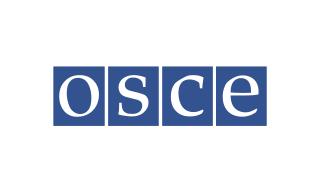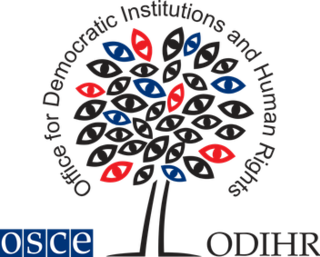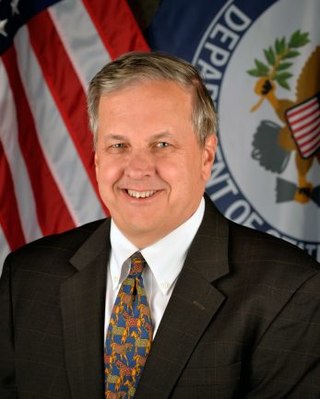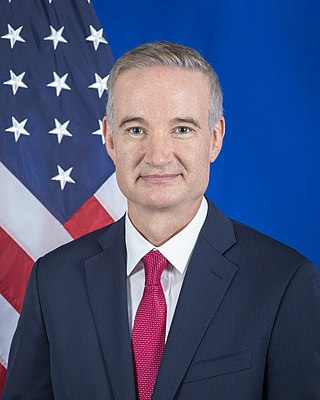
The Benelux Union or Benelux is a politico-economic union and formal international intergovernmental cooperation of three neighbouring states in western Europe: Belgium, the Netherlands, and Luxembourg. The name is a portmanteau formed from joining the first few letters of each country's name and was first used to name the customs agreement that initiated the union. It is now used more generally to refer to the geographic, economic, and cultural grouping of the three countries.

The Organization for Security and Co-operation in Europe (OSCE) is a regional security-oriented intergovernmental organization comprising member states in Europe, North America, and Asia. Its mandate includes issues such as arms control, the promotion of human rights, freedom of the press, and free and fair elections. It employs around 3,460 people, mostly in its field operations but also in its secretariat in Vienna, Austria, and its institutions. It has observer status at the United Nations.

The Commission on Security and Cooperation in Europe (CSCE), also known as the U.S. Helsinki Commission, is an independent U.S. government agency created by Congress in 1975 to monitor and encourage compliance with the Helsinki Final Act and other Organization for Security and Co-operation in Europe (OSCE) commitments. It was initiated by House representative Millicent Fenwick and established in 1975 pursuant to Public Law No. 94-304 and is based at the Ford House Office Building.

The GUAM Organization for Democracy and Economic Development is a regional organization of four post-Soviet states: Georgia, Ukraine, Azerbaijan, and Moldova.

The Common Security and Defence Policy (CSDP) is the European Union's (EU) course of action in the fields of defence and crisis management, and a main component of the EU's Common Foreign and Security Policy (CFSP).

The office of the OSCE High Commissioner on National Minorities (HCNM) is charged with identifying and seeking early resolution of ethnic tension that might endanger peace, stability or friendly relations between and within the participating states of the Organization for Security and Co-operation in Europe.

The Southeast European Cooperative Initiative (SECI) is a multilateral regional initiative that has been initiated by the European Union, the United States of America and the countries of Southeast Europe within the framework of the Organization for Security and Cooperation in Europe (OSCE) as a support to the implementation of the Dayton Accords in December 1996 at the inaugural session at Geneva on the basis of Final Points of Common EU-USA Understanding.
The International Federation for Human Rights is a non-governmental federation for human rights organizations. Founded in 1922, FIDH is the third oldest international human rights organization worldwide after Anti-Slavery International and Save the Children. As of 2020, the organization is made up of a federation of 192 organizations from 112 countries, including Israel and Palestine, including Ligue des droits de l'homme in over 100 countries.

The Office for Democratic Institutions and Human Rights (ODIHR) is the principal institution of the Organization for Security and Cooperation in Europe (OSCE) dealing with the "human dimension" of security. The Office, originally established in 1991 under the 1990 Paris Charter as the Office for Free Elections, is still best known for its role in observing elections although its name changed in 1992 to reflect the broadening of its role by the Helsinki Summit.

Ian Crawford Kelly is an American retired Foreign Service Officer and Ambassador (ret.) currently serving as the Ambassador in Residence at Northwestern University in Evanston, Illinois. He is an American former statesman and senior foreign service officer who last served as the United States Ambassador to Georgia, from 2015 to 2018. He previously served as the U.S. Ambassador to the Organization for Security and Cooperation in Europe (OSCE) from 2010 to 2013. Prior to his ambassadorship, Kelly held a variety of high-level roles at the U.S. State Department, including serving as the department spokesman under Secretary Hillary Clinton.
International Partnership for Human Rights (IPHR) is an international non-governmental human rights organization with its seat in Brussels, Belgium. It was established in the spring of 2008. It is a non-profit organization.
Ambassador Ersin Erçin is a senior Turkish diplomat, with an extensive experience in multilateral diplomacy particularly on matters of international, Euro-Atlantic and Eurasian security, disarmament, and economic and environmental security.

In the United States, the Assistant Secretary of Defense for International Security Affairs or ASD (ISA) is the principal advisor to the Under Secretary of Defense for Policy (USD (P)) and the United States Secretary of Defense on international security strategy and policy on issues of Department of Defense (DoD) interest related to the governments and defense establishments of the nations and international organizations of Europe (including the North Atlantic Treaty Organization), the Middle East, Africa, and the Western Hemisphere. The ASD (ISA) also oversees security cooperation programs and foreign military sales programs in these regions. Despite the broad title of the office, the ASD (ISA) does not develop policy related to Asia, the Pacific region, Latin America, or South America.

Relations between Azerbaijan and the Organization for Security and Cooperation in Europe (OSCE) began when Azerbaijan joined OSCE’s predecessor, the Conference on Security and Cooperation in Europe (CSCE), on January 30, 1992. This was the first European organization Azerbaijan joined. The CSCE transformed into the OSCE shortly afterwards in 1995.
The Netherlands Helsinki Committee (NHC) is a non-governmental organization that promotes human rights and strengthens the rule of law and democracy in all countries of Europe, and the Central Asian countries participating in the Organization for Security and Co-operation in Europe (OSCE).

Alex Thomas Johnson was the first African-American chief of staff of the U.S. Helsinki Commission since its establishment in 1976.

Michael R. Carpenter is an American diplomat who served as United States ambassador to the Organization for Security and Cooperation in Europe in the Biden administration.

An OSCE Needs Assessment Team in Armenia was deployed by the Organization for Security and Co-operation in Europe (OSCE) in the territory of the Republic of Armenia between 21 and 27 October 2022 following the Armenia–Azerbaijan border crisis.

Armenia–OSCE relations began when Armenia joined the OSCE's predecessor, the Conference on Security and Cooperation in Europe (CSCE), on 30 January 1992. The CSCE transformed into the Organization for Security and Co-operation in Europe (OSCE) shortly afterwards in 1995.
The Copenhagen Declaration is a text agreed by the CSCE in June 1990 at Copenhagen. It contains specific election-related commitments.














